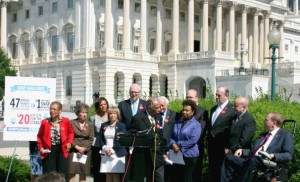
Politicians accepting the SNAP challenge meet to discuss the critical importance of food stamps to many low-income Americans.
Photo courtesy of http://www.washingtonpost.com/blogs/fact-checker/post/the-snap-challenge-the-claim-that-food-stamp-recipients-get-by-on-450-a-day/2013/06/19/110f6b14-d925-11e2-a016-92547bf094cc_blog.ht
Just last summer, 26 politicians protested House Republicans’ cuts to the Supplemental Nutrition Assistance Program (SNAP) by living off a food stamp budget for a week. This SNAP challenge meant that the 26 participating politicians survived on under $4.50 a day.
The politicians who accepted this challenge tweeted about their experiences under the hashtag #snapchallenge, often complaining about the difficulty of managing this budget and still purchasing enough food to survive. Yet, many conservatives still argue that Americans using food stamps indicate government dependency.
There are numerous other individuals who have tried the SNAP challenge in order to raise awareness about the plight of low-income Americans facing hunger. It might be too late because the 2009 Recovery Act’s temporary benefit boost ended in November and House Republicans voted on a bill that will cut $39 billion dollars from the program over ten years and further restrict those who qualify.
The Supplemental Nutrition Assistance Program is self-explanatory; it should serve as a supplement to an existing income. Millions of people depend upon the added safety net that SNAP offers and without it, they won’t survive. The truth is, without the added benefits of SNAP, Americans struggling now to put food on the table and fill their children’s bellies as well as their own, won’t be able to do put food on the table at all.
By $39 billion dollars from the SNAP program, approximately 3.8 million low-income Americans will lose benefits. This budget cut arrives at a time when a previous decline in budget already seriously hurt benefits to members of the SNAP program and the economy still struggles to create sufficient jobs for the growing population. Low-income Americans are searching for jobs, but for every job opening, there are three unemployed people.
People rely upon the SNAP program to make ends meet and in an economy such as the one America has now, the House shouldn’t have passed a bill cutting budget to a program that helps millions survive.